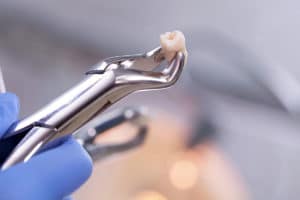The ultimate goal behind maintaining oral health care is about preserving your natural teeth so they last you throughout your lifetime. Sometimes it becomes necessary to remove a single bad tooth to preserve the surrounding healthy teeth. It's not a decision we take lightly.
Your teeth are a fragile and precious resource. One wrong bite, one loose tooth can spell disaster for your smile! Sometimes it is in the best interests of your oral health to have an impacted wisdom tooth removed by a dentist like Dr. Garret who has years of experience removing teeth with minimal discomfort or risk to other parts of the mouth.
Reasons For Extracting a Tooth

- It's always a good idea to get your teeth checked out if you've been suffering from Toothache, Trauma, Decay, and other dental problems. If the problem is too severe for simple treatments like filling cavities and removing plaque with an electric toothbrush then it might be time to install implants as replacements.
- Impacted Wisdom Teeth are what we all dread. They can cause big problems for the mouth, and it's best to remove them before they become a problem. If an impacted tooth is in a bad position, removal should be done early on so that these other parts don't suffer any more damage than necessary!
- Orthodontic treatment is a solution to overcrowded teeth. One common option for creating more space in the dental arches (jaws) is extracting some of your teeth, such as first premolars. First-premolar extractions usually lead to increased jaw and tooth symmetry after orthognathic surgery has been completed.
- Sure, Baby Teeth are tiny and adorable. But they can also be a pain in the neck if you're not careful! When it comes to munchkin mouths, watch out for any tooth that isn't there when it should be since that will often lead to orthodontic problems later down the line (ouch!) It's best to keep up with your little ones' dental care by having Dr. Garret check their pearly whites regularly.
The Process
First, we will take a digital scan to determine the position of the tooth roots and the condition of the surrounding bone. This will allow for the anticipation of any potential difficulties. To verify that you are healthy enough to undertake the treatment, a comprehensive medical and drug history will be collected, and your anesthetic choices will be addressed.
We want the process to be pain-free and as comfortable as possible. Local anesthetic is used to numb the teeth to be extracted as well as the surrounding bone and gum tissues. Additional sedatives may be employed, such as oral sedatives (pills), nitrous oxide (inhaled), and/or conscious sedation (intravenously) (into a vein). For more sophisticated (or many) tooth extractions, the latter is frequently required. You won't even be aware that the procedure was done by the time the anesthesia medication wears off.
While we are removing the tooth, we'll take careful steps to protect the bone that surrounds your tooth. When a tooth is extracted, a small amount of lab-processed bone-grafting material is sometimes inserted into the socket to assist preserve bone volume. This is especially critical if the extraction will be followed by the implantation of a dental implant, which must bond to existing bone, or orthodontics, which pushes teeth softly through bone.
What to Expect Afterward
The socket will be covered with sterile gauze immediately after your tooth is extracted, and mild pressure will be given for 10-20 minutes to control any bleeding. This can also be done with little sutures (stitches).
- It's usual to have some mild to severe discomfort and/or swelling after surgery. Most symptoms can be controlled by taking non-steroidal anti-inflammatory medicines like ibuprofen and/or aspirin on the day of operation.
- Antibiotics may also be recommended to ensure that the wound heals without infection.
- It may also be beneficial to apply ice packs to the outside of your jaw and consume softer meals until you feel more comfortable.
Everything should be back to normal in a few days.
Schedule Your Appointment at Yamaguchi Family Dentistry
Please fill out the form below and our Scheduling Coordinator will find the best time for your appointment and contact you.
If you have any questions or this is an immediate need, please call us at (360) 943-9480.